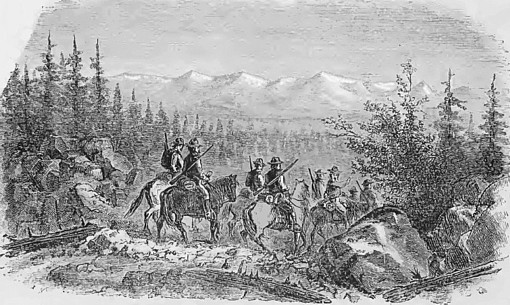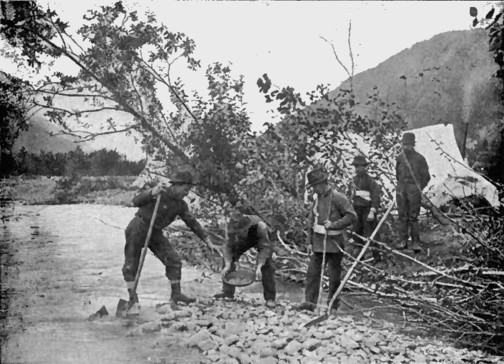In the latter part of March, 1848, before the California gold rush had really gotten underway, a man arrived in Stockton, then called Tuleburgh, bringing with him specimens of scale-gold, from Sutter's mill. He informed the people there of the recent discoveries on the American river, the specimens confirming his report; whereupon, Captain Weber, catching a spark of gold rush fever from the flame, fitted out a prospecting party, consisting of settlers on his grant, some strangers that chanced that way, and a force of Si-yak-um-na Indians, and commenced the exploration of the country east of Stockton, beginning at the Stanislaus, and working north. The gold fever was upon them; haste and nuggets their watchwords; inexperience their companion, and failure the result, until they had reached Mokelumne river, where the Captain decided to make a more deliberate search, the result of which was the discovery by him, on that river, of the first gold found in the section of country, that was afterwards known as the Southern mines. Owing to their more careful search and added experience, gold was found north from this river, in every gulch and stream to the American river. Arriving at Sutter's mill, it was decided to commence mining at what was called afterward Weber's creek, near Placerville.
As soon as he had got work on Weber creek well under way, he returned to Stockton, and organized a party to explore the country south of the Mokelumne River. In a short time they returned with finer specimens than had been found at Coloma. A mining company was formed, which afterwards gave name to Wood's creek, Murphy's creek, Angel's Camp, and other places. Then commenced the general working of the " Southern mines," the rush of gold miners, the immigration which built up the flourishing counties of Amador, San Joaquin, Calaveras, Tuolumne, and the changing of the world's commerce.
The Mokelumne River, the gulches at Drytown, Volcano, and lone, were mined extensively in 1848. General Sutter and party tried it near the town of Sutter, but he was disgusted with the opening of a saloon near his works, and left the mines, never to return. The gold rush emigration from the Eastern States, by way of the plains and the Horn, brought a large accession to the population, and brought about the necessity of some political organization. El Dorado County was organized with Dry creek as its southern boundary, Calaveras, with Dry creek as its northern limits. From these two territories, Amador was afterwards carved, first in 1854, by setting off the territory north of the Mokelumne from Calaveras, and in 1856-57, by the addition of the strip from El Dorado lying south of the Cosumnes, the boundaries farther east being rather indefinite, as will be here after seen.
When the lucky prospector had found a paying claim with sufficient gold, the next thing was to set up his household. From two to four was the usual number of the mess. The Summers were long and dry, and there was no discomfort in sleeping out of doors. But even in Summer a house, though humble it might be, had many advantages over a tent for comfort and security. A stray horse or ox would sometimes get into the flour-sack or bread-sack, upset the sugar, or make a mess of the table-ware. Wandering Indians would pilfer small things, or take away clothing, which might be left within reach; but in a cabin things were tolerably secure from depredation. A site for a cabin was selected where wood and water were abundant. These things, as well as the presence of gold, often determined the location of a future town. Bottle Spring (Jackson), Double Springs, Mud Springs, Diamond Springs, and Cold Springs, at once suggest their origin. In the earlier days, log-cabins were soon put up, for suitable logs were found everywhere. Though these cabins are in the dust passed into history there is no need of describing them, as the books are full of the "settlers' log cabin," and no boy of the present generation, who has arrived to the age of ten, would need instruction in building one.
The Winter of 1852-53, was perhaps the roughest time ever seen in California. The long spell of high water utterly prevented the transportation of provisions from the cities, and there was much want, though no actual cases of starvation. Many men lived for weeks on boiled barley. Beans, without even a ham-bone to season them, furnished, in some cases, the only food available to the gold miners for weeks. At one camp, a pork rind was borrowed from one house to another, to grease the frying-pan for slap-jacks.
A narrative of personal experience of one who lived on the south branch of Dry creek, in 1852, will give an idea of the troubles of that year: "It had been raining for about six weeks, and our claim had been four feet under water for a month. There were no gulches there that would pay, and we had been waiting for the rain to cease until every bit of provision of any description was gone, as well as money or dust. Something had to be done, even if the rain was coming down in torrents. There were four of us, one Yankee, two young married men from Illinois, and a man who had served in the United States army in the Seminole war, and. Also as a volunteer in the Mexican war. We shouldered our pick, shovel, and rocker, and started up towards Indian gulch. After going a short distance, one of the Illinoisians got to thinking of his young wife, and the pleasures of home compared with this country, and, overcome by his feelings, burst into a blubber of despair, and started on the run for the cabin, where he was found at night hovering over the cold ashes of the fire-place, the fire totally extinguished by his floods of tears.
At the head of Indian gulch we found some paying dirt. We went to work, and by dint of ground sluicing, rocking and panning, about four o'clock we had, probably, an ounce of gold dust. With this I started to Fiddletown to buy a supper for the boys. An ounce of gold dust, in 1881, will buy almost a year's provisions for a man, but with the gold rush prices of 1852 (flour at one hundred dollars per barrel, and meat seventy-five cents per pound), it was not much. After standing and thinking awhile, I remarked that I thought the rain would hold up shortly, so that provisions would get cheaper; believed that I would buy but a small quantity to-night, etc. Mr. Wingo, the gentlemanly trader, did not seem to notice my embarrassment, but politely sold me the little dab of flour and a piece of meat, which went down into the corner of the sack out of sight. I rushed off for the cabin, darkness coming rapidly on, and the rain still falling.
The creeks were now nearly waist deep, but I safely got through them all until I got to Dry creek. The log on which I crossed in the morning was gone, and the water was running high over the banks. Two or three hundred yards away was the cabin, and I knew, by the bright light shining through the cracks of the door, that a big fire had been built to cook our suppers, out of the proceeds of our day's work, and to dry our clothes, soaked by twelve hours' rain. A council of war was called, and all attainable information regarding roads, bridges, and ferries, called for. The creek was nowhere fordable; that proposition was disposed of without delay. One witness, or member of the council, had an indistinct recollection of having seen a tree across the creek a mile or two below, some days since, but could not vouch for its being there at present. This being the only information attainable, the commander ordered a change of base, to the possible bridge. Down the creek, in utter darkness, over rocks and bushes, stumbling and falling, and after an hour's hard work, the bridge was found. It was a cedar tree, the butt resting on the stump, the large top reaching to the opposite shore, and the middle sagged down so that the water was running, perhaps, two feet deep over the trunk, and threatening every moment to sweep the tree off its moorings; for, standing on its upper end, I could feel it swaying to the movement of the water. But the submerged part had limbs standing up out of the stream, and a charge in force across the bridge was ordered, I with this caution, ' My boy, if you go overboard, the boys will go without their suppers.' The opposite bank was gained in safety, by feeling the way and holding to the limbs; and, an hour later, some bread and fried pork, and a roaring fire, brought us to a comfortable condition, and gave us the spirit to laugh at all our troubles."


